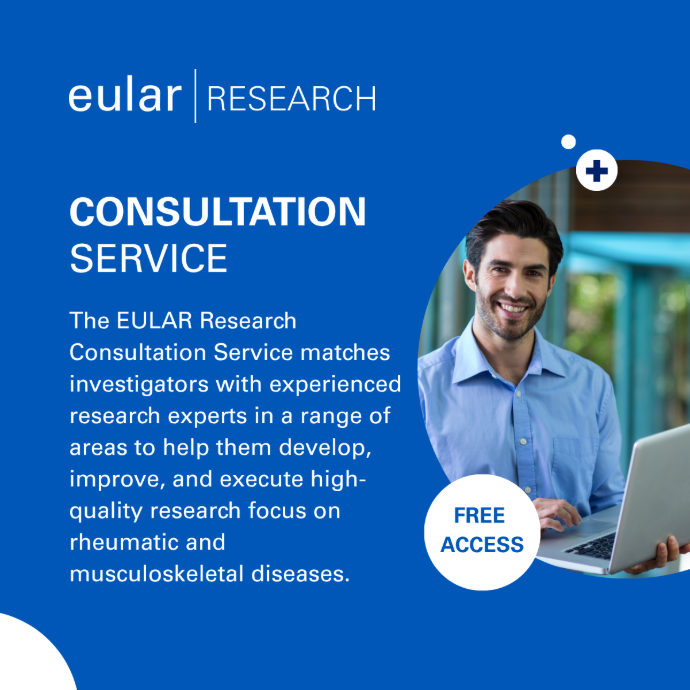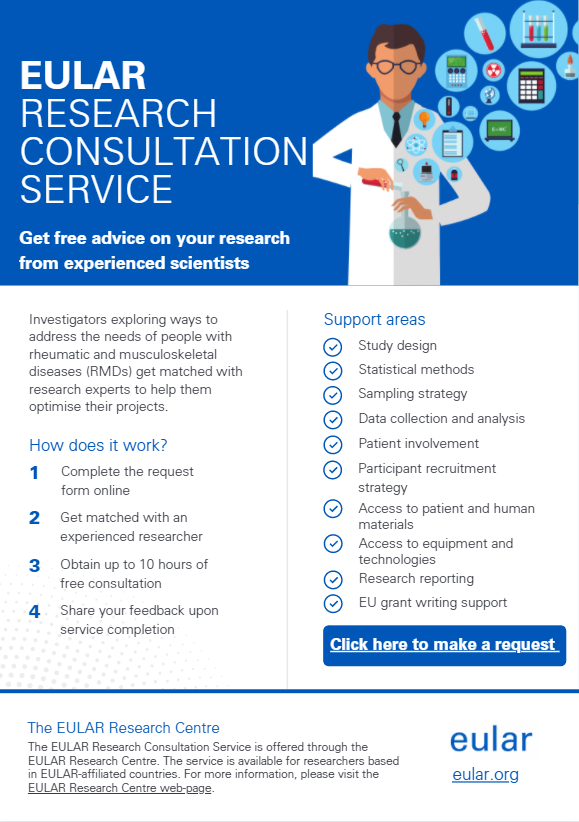EULAR Research Consultation Service

The EULAR Research Consultation Service matches investigators with experienced research experts in a range of areas to help them develop, improve, and execute high-quality research focused on rheumatic and musculoskeletal diseases (RMDs).
This service was established to give researchers — especially those who may not have easy access to established scientific networks — the opportunity to receive expert advice from seasoned investigators across a variety of research areas.
Up to 10 hours of free consultation
5 core domains
9 expert areas
80 consultants
Personalised advice
Consultation areas
Examples
- Development of research question, study aims.
- Analysis of facilitators and barriers to intervention implementation; design, evaluation, comparison of implementation strategies.
- Evaluation of health services redesign; improvement and evaluation of the quality of health care services.
Examples
- Selection of study design, study population and controls, statistical methods, power analysis/sampling strategy.
- Traditional randomized controlled trials, pragmatic trials/effectiveness studies, adaptive trials.
- Alternative study designs such as:
- Observational studies (e.g., case control, registries), comparative effectiveness research
- Qualitative and quantitative methods for the evaluation of health care processes
- Quasi-experimental studies (e.g., interrupted time series, pre-post designs, stepped wedge study designs, hybrid study designs)
- Mixed method studies
- Community-engaged research
- Methodological studies
- Literature reviews and meta-analysis
- Theoretical frameworks
- Conceptual models
Examples
- Identify research priorities
- Define research questions
- Advice on all aspects of the study design, selection of patient-relevant outcomes, selection, design, and validation of research instruments (e.g. surveys, Delphi method)
- Use of community-engaged and participatory research design methods and frameworks (e.g. principles of co-creation)
- Involving patient research partners (PRP)
- Development of a patient advisory panel
- Research participant recruitment
- Dissemination strategies, lay summaries
Examples
- Design of data collection and management plan, database design.
- Patient-generated health data issues such as data ownership and storage.
- Usage of data from medical records, registries and/or administrative data; qualitative data collection and management.
Examples
- Advice on written sections of a protocol.
Examples
- Role of point-of-care recruitment in rheumatology, cross-continent recognition.
- Information sheets, consent guidelines and forms.
Examples
- Advice on conducting data analysis, multiple imputation, statistical issues, modelling.
- Generalisability issues regarding qualitative vs. quantitative research; different methods of qualitative and mixed methods data analysis.
- Qualitative analyses methods, e.g. qualitative content analysis, narrative analysis, discourse analysis, thematic analysis, grounded theory (GT), interpretive phenomenological analysis (IPA).
Examples
- Use of reporting guidelines for specific study types (e.g., STROBE, CONSORT, PRISMA, SRQR, SQUIRE).
- Responding to reviewers including understanding why a paper was rejected and how to improve it.
- Reporting of research data, data visualisation, and writing tips for successful academic articles.
- Presentation of study results at conferences and other events, design of posters, presentation slides.
- Dissemination of findings to the public, policy makers, and implementers.
Examples
- Currently limited to EU grant applications that focus on RMD research.
- Advice from successful EU grant awardees, including general feedback on the proposal/concept; specific aims; study design and approach; finding collaborators to contribute to the proposal; EU grant budget development.
Who appoints consultants to incoming requests? Research chairs appoint consultation requests to our expert panel members. See our expert panel members
Eligibility
The service will be available to investigators who are currently residing and working in EULAR-affiliated countries. Support will be limited to 2 annual projects per investigator per calendar year.
Participation of Patient Research Partners
It is highly desirable that patient research partners will be involved in any projects that EULAR will support.
Additional EULAR Research support opportunities
Beyond the Consultation Service, EULAR provides a range of services and resources, including training, funding, databases and expert networks, to support RMD research of investigators from EULAR-affiliated countries. Find out more here.
Contact and further information
All publications and projects supported by the utilisation of the EULAR Research Consultation Service are required to credit EULAR.
- For any questions please contact research@eular.org
- For more about EULAR research support and initiatives, visit the EULAR Research Centre pages.
Related Information
The EULAR Research Consultation Service
How does it work and what can you get?
Sign Up to the EULAR Research Newsletter
To keep up to date with EULAR and developments around the EULAR Research Centre, sign up to receive the Newsletter here.
Related News Stories
- Read more about the EULAR Research Centre: Levelling the playing field of RMD research across Europe to address patients’ needs: the emerging EULAR Research Centre
- EULAR Launches Impact of RMDs Survey
- EULAR Launches RheumaFacts
EULAR Research Interview Series
-
Opportunities and challenges in rheumatology research in Hungary
- EULAR’s Scientific Training Grant Helps Slovenian Master Student Develop Critical Research Skills in Experimental Rheumatology
Questions?
Contact the Research team at research@eular.org
